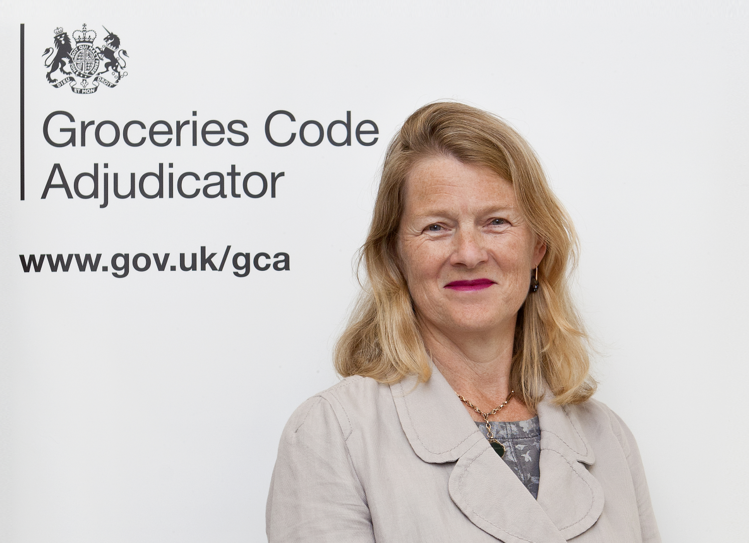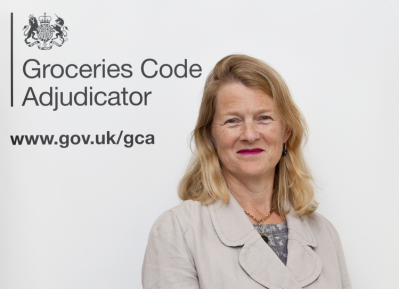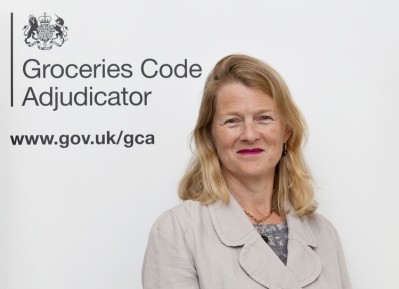Groceries Code Adjudicator to step down

Tacon’s announcement followed the Government’s launch of its second 12-week review of the GCA on 20 June and came as she set out a fresh approach to compliance with the Groceries Supply Code of Practice (GSCOP).
She told the 2019 GCA Annual Conference: “I am introducing a common factors approach to guide their compliance risk management activity.
“However they are set up, I want to see the retailers build for themselves a whole-organisation approach to Code compliance. This puts their compliance management thinking into their overall governance structures, their legal and audit functions, as well as their internal systems and processes, into their training and their communication with suppliers.
“This is the best way to make sure that breaches of the Code don’t happen and, if they do, that they are quickly picked up and put right. It means retailers doing the right thing not only because that is what is required of them, but because it makes good business sense.”
Annual survey results
Tacon set out her vision after her annual survey revealed continuing improvement in retailer behaviour. For the second year running, only four out of ten suppliers reported having experienced an issue at any point in the year.
Last year’s top concern for suppliers – delay in payments – fell from 19% to 13% in a period when the retailers’ response to the issue was under formal monitoring by the GCA.
Forecasting was now the issue most reported by suppliers and that, too, had continued to decline. In addition, Co-operative Group topped the table as the biggest improver after significant scrutiny from the GCA following a year-long investigation, which found that the retailer had breached the Code.
Co-op biggest improver
“Co-op should be really pleased that the steps it has been taking to improve things are already being noticed by suppliers,” said Tacon. “More significantly, I believe my investigation into Co-operative Group Limited can be a game-changer for the sector.
“The root causes I identified as a result of that investigation showed the extent to which the retailer had failed to take charge of its own Code compliance. Opportunities to manage and minimise its compliance risk had been missed, and themes emerged which were not only common to Co-op’s breaches of the two paragraphs of the Code I investigated, but also familiar to careful readers of my previous two case studies.
“I now intend to build the lessons I learnt into my approach with all regulated retailers. I want to leave this role having achieved all I set out to do – and more.”
Alliances, JVs and mergers
The Adjudicator also said she would be examining how the Code should apply to the various buying alliances, joint ventures and merged entities run by the regulated retailers. She claimed this was important, because arrangements of these kinds were increasing in the groceries sector. And she announced that she had secured agreement from Waitrose and Ocado to the voluntary commitment achieved with eight of the original ten retailers in 2014 to limit forensic audits to the current year plus two.
The use of forensic auditing by retailers, involving the examination of email exchanges up to six years old to identify ways to claim extra charges from suppliers, surfaced in 2014.
Forensic auditing had been the top issue in the 2014 GCA survey, when 45% of suppliers reported a concern with the issue. In the 2019 survey, that had fallen to 7%.
Extension of GCA remit
Commenting about whether the role of the GCA should be extended, whether up the supply chain or to cover things the Code was not currently designed to address, Tacon said: “I am clear in my own mind that it would mean significant change in the way the work of the GCA is done. The levy funding model would have to be altered, so a few large retailers were not paying for the GCA to regulate arrangements over which they had no direct control.
“The collaborative approach I have established would not have been possible with a much larger cohort of regulated businesses, or if my job were to champion individual supplier issues or causes. And thought would have to be given to the fit between any new price-based measures and the competition position underpinning everything the GCA is currently established to do.”
Aldi best performer
Meanwhile, Aldi has been named the best-performing retailer in respect to complying with the Groceries Suppliers Code of Practice for the sixth consecutive year.
The latest survey by the GCA revealed that 97% of suppliers said Aldi complied “consistently well” or “mostly well” with the Code.
Second GCA review
The Government announced on 20 June that it would be launching its second review of the regulator, looking into its performance including:
- how the GCA’s powers had been exercised;
- how effective the GCA had been in enforcing the Code;
- whether to amend or replace the fining powers of the GCA (currently set out in Permitted Maximum Financial Penalty Order 2015); and
- whether to make an Order clarifying the information that the GCA may consider when deciding whether to launch an investigation.
Legislation requires the Government to periodically review the performance of the GCA and the first review was carried out in 2016. The previous review found that the Adjudicator was making effective use of her powers and was effectively enforcing the Code through collaborative working with the large retailers.

















